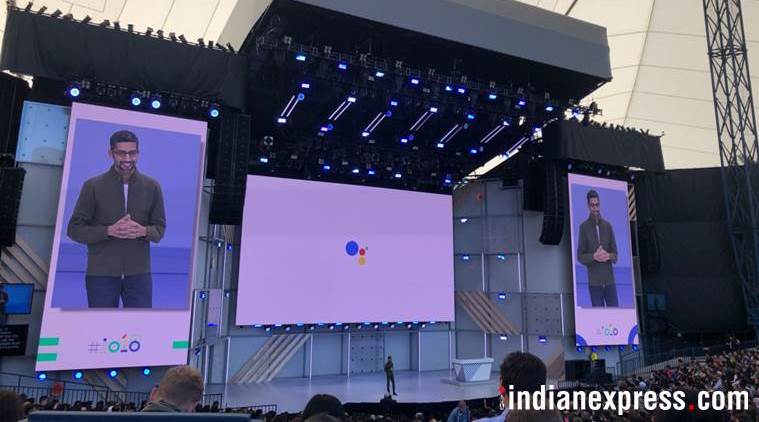 The highlight of Google Assistant will be the ability to call and book appointments on behalf of the user. (Express photo)
The highlight of Google Assistant will be the ability to call and book appointments on behalf of the user. (Express photo)
For most technology companies, the focus on machine learning and artificial intelligence is no longer just about buzzwords. Be it Amazon’s Alexa or the Google Assistant, AI-driven assistants have taken over phones, speakers and promise to make life a lot easier for users. And while most Assistants can handle a user’s requests like give alerts about the weather or remind one of the appointments, there’s still a lot of scope that remains unfulfilled. Google at its I/O keynote showcased the next frontier for Assistants: one where they can have a full-fledged conversation with humans just as we would speak to one another.
During the keynote, Google gave a demonstration of the Assistant actually making a call on behalf of the user for fixing an appointment. In the demo, the Assistant was able to make a call to a hair salon, and have a conversation with the person on the other end as it tried to book an appointment for the user. The Assistant was asked to book an appointment between 10 to 12 and it was able to hold a conversation with the other side as it negotiated this task. Based on the demo, the idea of an Assistant making perfectly normal conversation with real humans might not be so far behind.
In another part of the demonstration, the Assistant calls for a restaurant booking and Google showed how it would handle the call when the request is not successful. In this case, there was no booking available at the restaurant, but to quote Google CEO Sundar Pichai, ‘the Assistant handled this in a dignified manner’.
This human-computer interaction in natural language, which means language as humans speak it and not in fixed commands, is something that’s not been possible so far. So how did the Google Assistant manage to hold a conversation with another human, while sounding perfectly ‘normal’? That’s thanks to Google’s Duplex technology, which is powering this voice interaction.
In a blog post on Google Duplex, the company explains that the application of deep neural networks like Google Voice Search, WaveNet are what have boosted these advances. With Google Duplex, interactions with automated systems in the future could change dramatically. In the future, talking to a machine will be more natural and conversational, just as Google demonstrated.
 Google has not given any date on when the Google Assistant will get this feature for making actual calls.
Google has not given any date on when the Google Assistant will get this feature for making actual calls.
What is Google Duplex?
Google says this is a new technology for conducting natural conversations for “real world” tasks over the phone. This is geared for completing tasks like fixing appointments while making the conversation sound as natural as possible. As the Google demonstration showed, the experience would like speaking with another human, not a machine. However, Duplex cannot carry general conversations outside of its domain expertise.
The key is that Google Duplex can understand the context in these sentences when trying to book an appointment. For regular automated systems, this is a challenge. Duplex can also understand and process complex sentences, which might not be a challenge for humans, but most machines stumble on this front.
Google Duplex has what the company calls a “recurrent neural network” which can handle the challenges of complex sentences. It has been built with the company’s TensorFlow Extended (TFX). TensorFlow is Google’s open-source library for building machine learning applications.
For Duplex to be this accurate, Google relied on phone conversation data, which was anonymised. For the training of the Duplex system, Google also relied on experienced operators who acted as the instructors to help the system reach the desired quality level. After this, the system was able to make calls on its own. But it also has self-monitoring capability, says Google. This means it can also recognise when a request is given for a really complex appointment and which it cannot complete. In this case, it will ask a human operator to step in.
So when can I ask my Google Assistant to book my appointments?
This feature will take some time to roll out. Google has not given any date on when the Google Assistant will get this feature for making actual calls. As Sundar Pichai said during the keynote, the company has to get this one really right, and it will be rolled out once the system is perfect. However, if one goes by the demo, once the feature is made available it will give Google Assistant a serious edge over the competition.